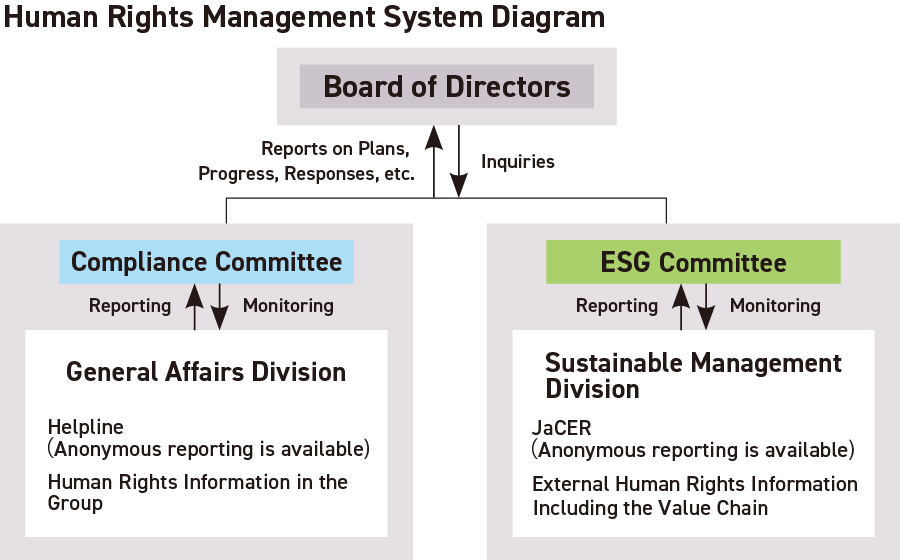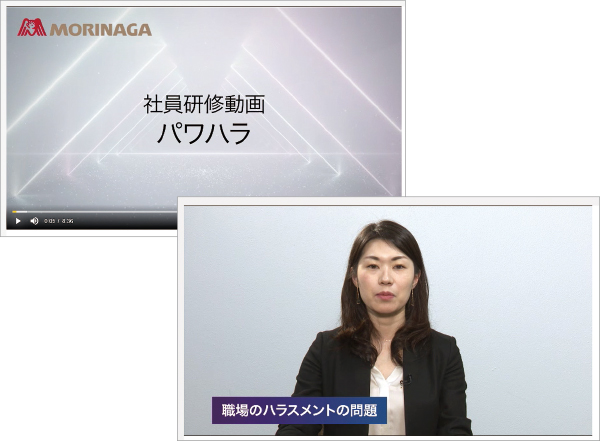Morinaga Group works to respect human rights of stakeholders within the company and in the value chain, respecting international frameworks and norms, including the UN Guiding Principles on Business and Human Rights.
In April 2022, we signed the UN Global Compact and utilize its principles to guide our human rights management.
In accordance with international norms including the UN Guiding Principles on Business and Human Rights, we regularly review our human rights policy and engage in human rights due diligence, while educating employees through various training programs and so on. In "Morinaga Group Human Rights Policy", which we revised in 2023, in addition to eliminating discrimination, harassment, child labor, forced labor, and human trafficking, we have made it clear that we will pay what is considered a living wage; eliminate discrimination, including gender-based, in recruitment and treatment; and avoid advertisements that have a negative impact on children.
In addition, we have a grievance mechanism that accepts reports on "business and human rights" from both inside and outside the company, including from overseas.
We have established the Morinaga Group Charter of Conduct and Code of Conduct, the Morinaga Group Human Rights Policy, and the Morinaga Group Supplier Guidelines. We are working to instill the concept of human rights expressed in these guidelines through human rights and compliance training for directors and employees, and through explanatory meetings for suppliers. If concerns arise within our group, or if information reaches the helpline, which allows anonymous reporting, it is reported to the Compliance Committee. If concerns arise outside the company, or if information reaches the JaCER Dialogue and Relief Platform, which is an external reporting service, the Sustainable Management Department and the Human Rights Subcommittee compile the information and report it to the Sustainability Committee. In the unlikely event that concerns arise that undermine respect for human rights, the Compliance Committee and the Sustainability Committee, as shown below, discuss measures to be taken, and the Board of Directors, which receives reports and reports from both committees, supervises and gives instructions. In FY2023, the Sustainability Committee established the Human Rights Subcommittee. This subcommittee promotes human rights initiatives, including examination of the possibility of human rights issues arising and measures to be taken when such issues emerge. In addition, not only in times of emergency, the Sustainable Management Department, Legal Department, Production Division, and Human Resources Department, which are members of this subcommittee, work together to prevent and mitigate human rights risks.

As part of our human rights due diligence initiatives, we conducted a theoretical evaluation on the negative impacts of the Group’s business on human rights. At present, we have reaffirmed that consideration for occupational health and safety and the rights of foreign workers is required more than ever in manufacturing processes inside and outside the Group, and that there are various issues related to wages and working hours in raw materials other than child labor in cacao-producing areas. While verifying the results of this assessment, we will continue to work to identify specific negative impacts.
The Morinaga Group conducts a compliance survey in every December, targeting all employees working at domestic Group companies (the number of respondents to the survey conducted in December 2022: 3,730), with the view to determine the level of compliance in the Group on a regular basis. In the survey, we attach a special attention to harassing behaviors and include questions asking whether the respondent was directly harassed or saw or heard of a harassing behavior in the last 12 months and in any past year, respectively. Answers to these questions are tabulated separately so that we can have a detailed view of the Company’s level of compliance.
We also ask questions about the corporate culture that respects for workplace compliance as well as the respondent’s view on the Company’s degree of engagement in the compliance management, in an effort to identify our employees’ level of compliance awareness. The summary of the survey results is fed back to all the survey respondents to share the understanding about the extent of the Group’s compliance.
Furthermore, as part of our proactive activities for an improvement of corporate culture, these results are used as a basis for holding interviews and opinion exchange sessions with respective business offices and making proposals on possible measures to solve compliance issues.
There is a helpline system in place to report compliance violations and seek consultation about issues related to wrongful acts of corruption including bribery and cases related to human rights such as harassment and discrimination.
In October 2022, the Morinaga Group joined Japan Center for Engagement and Remedy on Business and Human Rights (JaCER) as one of its inaugural members, and established an external third-party grievance platform as a grievance mechanism for internal and external stakeholders, not only employees.
The Company aims to ensure legitimacy of the process and improve the effectiveness, efficiency, objectivity, and transparency of grievance handling by accepting grievances through "Engagement and Remedy Platform", a non-judicial and third-party platform which is in compliance with the United Nations guiding principles on business and human rights.
We will make every effort to help the parties concerned by protecting the personal information of the informant, and upon the informant's request, ensure the anonymity and confidentiality of the content of the report.
In FY2022, the Morinaga Group conducted training on “Business and Human Rights” for its executives. The same training was also conducted via e-learning for all employees in Japan in FY2024.
The training focused on the concept of respect for human rights based on the UN Guiding Principles on Business and Human Rights, and provided examples of human rights issues that may arise in various business activities.
In addition, we informed employees of the Morinaga Group's Human Rights Policy and urged them to thoroughly implement it. Participants were also reminded that there are both internal and external consultation desks available as a grievance mechanism, which can be used by not only employees but also other rightsholders, including business partners, when necessary.
In a participant survey conducted after the training, multiple participants commented, “I have reaffirmed the relevance of human rights to my business activities,” and “I would like to pay more attention to human rights in the production areas of raw materials.” We believe that this training program has led to an increase in awareness of “business and human rights” among our employees.
According to our pro-human rights policy, we set the elimination of harassments as a goal of our compliance activities. In our compliance training sessions, we continuously provide educational programs designed to prevent and raise awareness about power, sexual, and other harassments.
We are engaged in a wide range of activities, including harassment training for all Morinaga executives by external lawyers, harassment training for all Morinaga all division managers, business site managers, and group company executives, and providing training videos on the website for all Morinaga employees, including managers.
Through regular training, all employees with subordinates, including managers, confirm how to respond to reports or reports of harassment.

Online anti-harassment training
Morinaga Group supports initiatives to eradicate child labor and gender equality awareness activities in cacao-producing countries through the One Chocolate for One Smile campaign. We exchange opinions for future initiatives while learning about local conditions from relevant NGOs.
We are also assessing and addressing human rights issues in the supply chain through our CSR procurement surveys based on the Supplier Guideline.